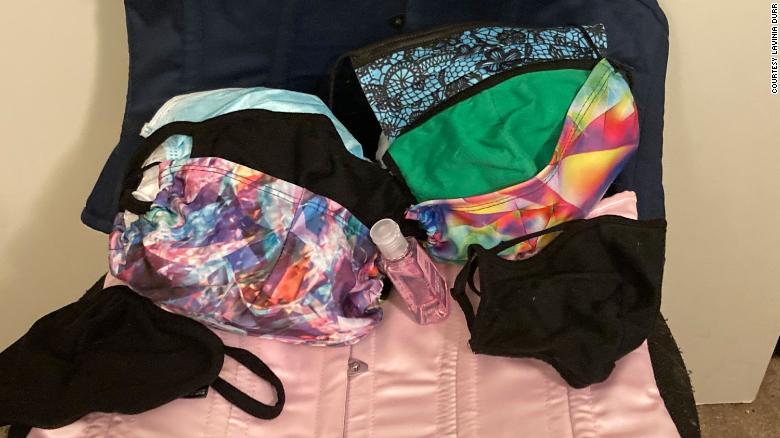The masks and corset Lavinia Darr wears to mitigate her body dysmorphic disorder.
(CNN) -
For Lavinia Darr, a public bus was dangerous territory.
There were the other passengers, whom he feared were horrified by his physical defects.
And there were the mirrors and the windows, which she knew would drive her to a deep hatred of herself.
The daily commute weakened the 23-year-old, because body dysmorphic disorder (BDD) defined many parts of her daily life.
But one afternoon in a pandemic-shaken 2020, Darr compulsively checked the bus mirror for flaws and saw a mask in its place.
LOOK: Body dysmorphic disorder and eating disorders, killers that go hand in hand
advertising
"I couldn't see any of the characteristics that I was obsessed with," he told CNN.
“The mask covers my nose and jaw, and I said, 'Wow.
My hair is very nice today.
Usually, Darr said, a glimpse of her reflection leads her to dysmorphic thoughts.
But now, for her and others battling body dysmorphic disorder, wearing masks makes everyday life more bearable.
Body dysmorphic disorder is an extreme condition that can take some to extremes
BDD is a psychiatric illness in which people are concerned about perceived physical defects to the extent that they affect daily functioning.
For Darr, one of the five to 10 million people with body dysmorphic disorder in the US, those defects are his chin and nose.
He wants "a jaw that can cut glass," he says.
And she compulsively performs maneuvers to manipulate her face for this purpose.
"I take my thumbs and slide them against my jaw to try and make it look different," he said.
LOOK:
Plastic surgery inspired by filters and photo editing applications is not going to disappear
Darr's review of his body, whether with his thumbs or in the mirror, is compulsive among many.
Others with body dysmorphia may scratch their skin or seek cosmetic surgeries.
In severe cases, patients can perform self-surgeries and amputations.
Dr. Eda Gorbis has worked with BDD patients since the 1990s and serves as the director of the Westwood Institute for Anxiety Disorders, Inc. in Los Angeles.
He said he has seen patients with more than 100 plastic procedures in tow.
"It is a very serious medical illness," he said.
'Feedback from the eyes and the brain is not processed correctly.
They don't see the forest for the trees, so they focus too much on the details.
Masks help them camouflage themselves, up to a point
For people like Darr with fixations on their faces, masks can alleviate some of these compulsive symptoms.
Masks make it easier.
This whole year wearing masks has been great, ”he said.
"Protect other people from my mysterious ugliness, and myself."
Gorbis has noted that many of his patients are relieved by the widespread use of masks.
MIRA: They find a relationship between the excessive consumption of marijuana and suicide attempts in young people with mood disorders
She said the pandemic has supported a pre-existing tendency for patients with body dysmorphic disorder to isolate themselves and hide their features.
"Without the pandemic, they camouflage themselves," Gorbis told CNN.
They don't venture out.
So staying home for them now is great, and wearing a mask is great. "
But, Gorbis said, it is not a long-term solution.
The fixation points for patients with body dysmorphic disorder are not really fixed.
"It's like hypochondriacs," he said.
"With hypochondria, [the obsession] goes from one organ to another: 'It's my appendix, it's my heart, it's my stomach.'
With BDD, it is the part of the body.
But it's a step toward self-acceptance for some
Eli, a 23-year-old trans man, asked not to be identified by his full name for privacy reasons.
He said he understands that masks are not the only solution to his problems.
But suffering from both BDD and gender dysphoria, he said they help him and others better assert their gender identity.
Now more than ever, people are correctly categorizing it in public spaces.
"I walked into a grocery store wearing a mask and baggy clothes, and someone tapped my shoulder and said 'Excuse me, sir,'" he told CNN.
I don't even remember what they said.
All I remember is that they called me 'sir'.
Unable to take testosterone, Eli said both gender dysphoria and BDD cause her to focus on her face.
"I have very smooth features and a very smooth jaw," he said.
"When I wear a mask, it hides my jaw and I feel much more confident."
He said that DBT adds another layer of difficulty when it comes to self-acceptance as a trans person, especially when it comes to communicating your sexual inclination.
"I fought with myself about it for years," he said.
"I have communicated this four different times in my life, and then I push myself back into hiding."
However, having the right gender helps, and the way masks facilitate this makes them a "security blanket," he said, as he works toward self-acceptance.

